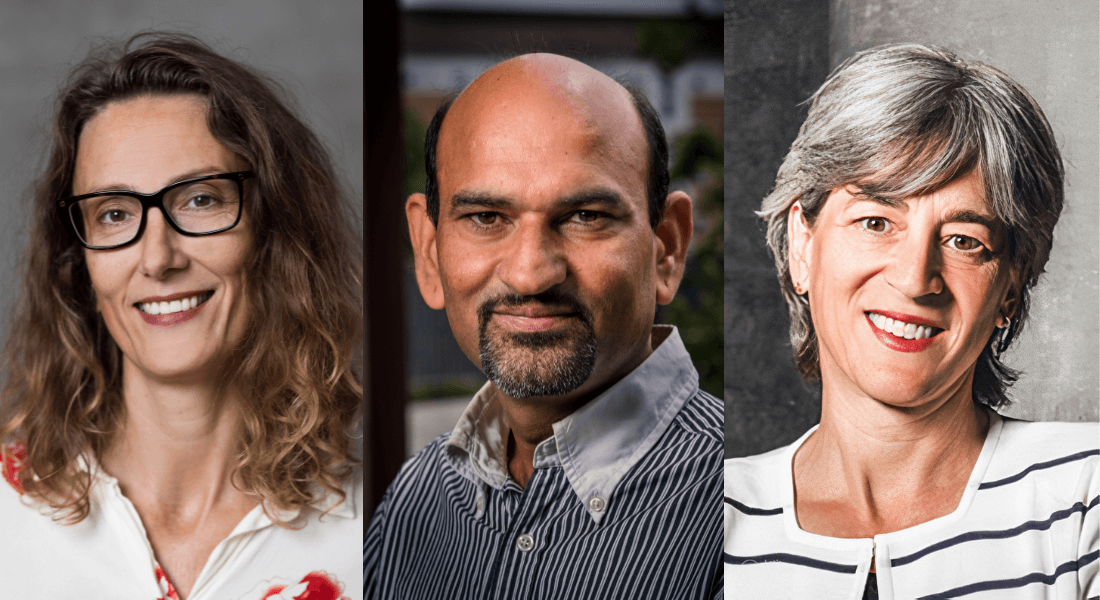Tre SUND-forskere modtager prestigefulde ERC Advanced Grants
Tre forskere fra Det Sundhedsvidenskabelige Fakultet har modtaget ERC Advanced Grant-bevillinger på hver 18 millioner kroner, som understøtter deres innovative forskningsprojekter over de næste fem år.

Professor Anja Groth, professor Chuna Choudhary og professor Juleen Zierath fra Det Sundhedsvidenskabelige Fakultet (SUND) på Københavns Universitet har hver modtaget Det Europæiske Forskningsråds (ERC) mest prestigefyldte bevilling, Advanced Grant. Juleen Zierath er også ansat på Karolinska Institutet, hvor hendes bevilling også er primært forankret.
De modtager hver 2,5 millioner euro over en periode på fem år, og bevillingen understreger deres betydning som veletablerede forskere, som har opnået markante gennembrud de sidste 10 år. Advanced Grant-bevillingen støtter specifikt forskere, som driver banebrydende men risikofyldte forskningsprojekter over en længere periode.
Alle bevillinger gives til den enkelte forsker uafhængigt af ansættelsessted. Professor Juleen Zieraths bevilling tager udgangspunkt hos Karolinska Institutet, der er vært for forskningsprojektet, mens Københavns Universitet indgår som partner.
Dekan Bente Merete Stallknecht siger:
”Det er fantastisk, at vi også i 2024 har tre forskere fra SUND, som modtager ERC Advanced Grant-bevillinger. De er på fornemmeste vis med til at flytte grænserne for forskningen og understreger endnu engang, at KU og SUND er med helt fremme blandt de bedste i Europa, hvis ikke i verden,” siger hun.
Hvad er det europæiske forskningsråd
ERC spiller en afgørende rolle med hensyn til at gøre det muligt for forskere at udforske deres mest innovative og ambitiøse idéer. I sin seneste runde har ERC tildelt i alt 255 bevillinger til forskningsledere i hele Europa, svarende til næsten 652 millioner euro.
Som en del af EU's Horizon Europe-program er bevillingerne kendt for at støtte projekter med høj risiko med tilsvarende høj belønning (high risk–high reward), som kan føre til store videnskabelige gennembrud. Bevillingerne forventes også at skabe mere end 2480 jobs til postdocs, ph.d.-studerende og andet personale på værtsinstitutioner.
Professor Anja Groth, Novo Nordisk Foundation Center for Protein Research (CPR)
Title: Epics: Epigenetic memory by communication across chromosome scales
The ability of cells to specialize and maintain their identity through multiple cell divisions is critical for development, tissue renewal and cancer avoidance. A key frontier is therefore to understand epigenetic cell memory that governs transmission of genome function to daughter cells. Our project targets a new paradigm for the inheritance of epigenetic information, focusing on communication between the chromatin landscape and spatial genome organization to safeguard cellular identity and prevent unwanted changes linked to aging and cancer.
Current models for epigenetic inheritance lack a spatial dimension, integrating that similar chromatin types separate spatially in the nucleus and replicates in a coordinated fashion. We will develop new technology to reveal how full chromosomes – including their organization in nuclear space - are replicated and address how these mechanisms regulate cellular plasticity and cell fate.
It is a great honour to receive the ERC Advanced Grant, the most prestigious research grant in Europe. I am grateful for this important recognition that follows earlier ERC Starting and Consolidator awards to my team. I am proud that CPR receives two of these prestigious grants, which testifies to the scientific excellence that Dir. Jiri Lukas has fostered at SUND.
Professor Chuna Choudhary, Novo Nordisk Foundation Center for Protein Research (CPR)
Title: ACT-SIGNAL: Lysine Acetylation: The Scope and Function in Gene Activation
Protein modifications play a crucial role in regulating protein function, stability, and cellular localization. Among the oldest known modifications is lysine acetylation. Among these, lysine acetylation stands out as one of the earliest known modifications. Despite extensive study in epigenetic gene regulation, our comprehension of its biological functions and regulation remains incomplete.
In this project, we will utilize a combination of CRISPR-based gene editing, quantitative proteomics, and next-generation genomics to investigate the nature of acetyltransferases that regulate individual acetylation sites and their role in controlling gene transcription. Our group has a long-standing interest in studying the role of protein modifications and cellular signaling. I am very excited about the idea of this project and extremely grateful for receiving the ERC Advanced grant, my second ERC grant (following an ERC Consolidator grant in 2014). This grant reflects the scientific excellence of our institute, the Center for Protein Research (CPR), which has garnered 10 ERC grants—a notable achievement for a research center of our size in Denmark.
Professor Juleen Zierath, Novo Nordisk Foundation Center for Basic Metabolic Research
Title: CIRCAMET - Circadian Control of Systemic Metabolism in Physiology and Type 2 Diabetes
This project aims to uncover the mechanisms underlying the relationship between the circadian clock, energy sensors (diet and exercise), and metabolism, and their dysregulation in type 2 diabetes. Our overarching hypothesis is that synchronizing energetic stressors (diet and exercise) to the molecular circadian clock can maximize the health benefits on metabolism.
By combining analyses in basic circadian biology and translational metabolic research, this research program seeks new insights into preventing and treating insulin resistance in type 2 diabetes. Although one can take a reductionist approach and study the contribution of a single factor to the control of metabolism, the field is moving forward towards profiling changes across a broad swathe of factors using ‘omics’ technologies.
The Advanced Grant enables the team to address high risk/high reward questions that have clinical relevance for people living with type 2 diabetes. Results emanating from the proposed studies may inform future clinical guidelines to the management of type 2 diabetes.
Kontakt
Press Officer Søren Thiesen
presse@sund.ku.dk
